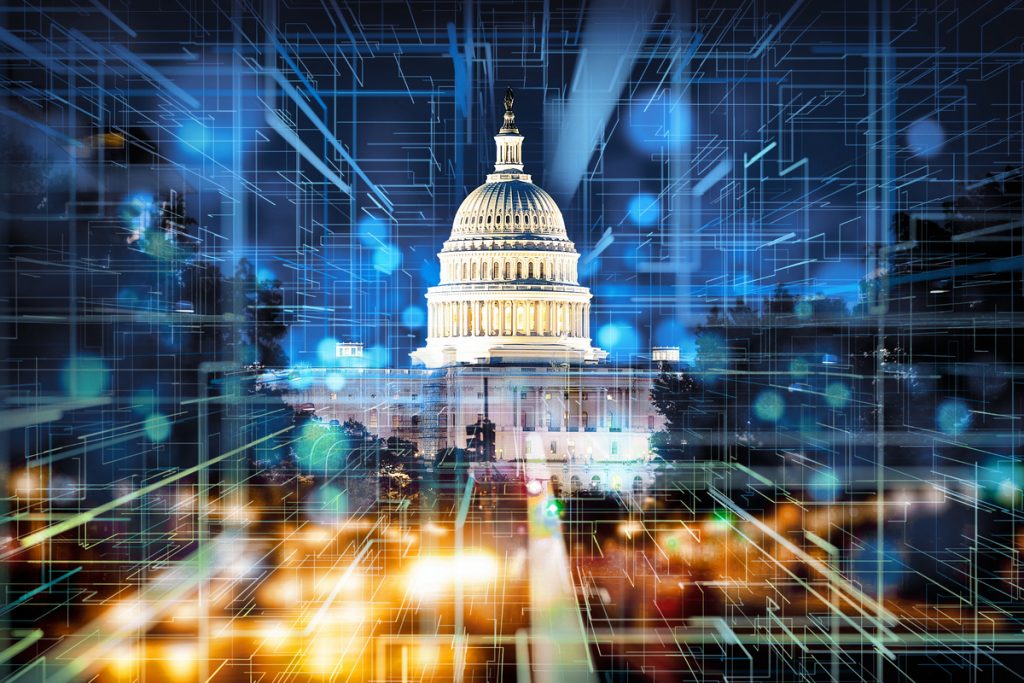
After the votes were counted, and recounted, the victors determined, and a new president and veep inaugurated, the long-awaited question could be answered: How would the incoming administration foster a new era for tech and advance the opportunity for an industry reset that can cure what ails us?
The executive branch led by Joe Biden and Kamala Harris has been given the opportunity to make progress on several tech-related issues, including equitable broadband access, the impact of AI and automation, and matters of digital privacy and security, to name just a few.
The new American president is likely to end the Trump administration’s practice of targeting individual companies for punishment outside of normal regulatory processes, as it did in disputes involving Amazon, TikTok, Huawei and others. With control of the Federal Communications Commission passing back to Democrats, look for pushes to increase subsidies for universal high-speed internet and possibly to help municipalities build public broadband networks; an effort to revive Obama-era net neutrality rules (Ajit Pai is exiting), and quick rejection of continued action on Trump’s Section 230 executive order.
The trade war with China will likely pause in detente as both sides reassess the landscape. Broader U.S. conflicts with China may be with us for the long haul. But how the Biden administration chooses to address them will also shape the terrain on which U.S. tech vies for global advantage in new markets like artificial intelligence, 5G innovation and VR/AR.
Democrats will need to pull out a long-shot flip of Senate control to pass new laws. So expect little immediate change in the progress of antitrust enforcement against tech companies — including the Justice Department’s lawsuit against Google and a possible move by the Federal Trade Commission and/or several states against Facebook. The aggressive findings of a House Judiciary report as well as Trump DOJ’s expansive claims against Google are “on the books.”
Here’s what leaders at tech companies in the Seattle region and across the industry at large have to say as the new administration prepares to take office in January:
Brad Smith
President | Microsoft
At Microsoft, we believe that Americans share more common ground than many pundits acknowledge, particularly when it comes to technology issues. On many of these matters, there is an opportunity to separate policies from politics so we can make a real difference in people’s lives.
Today, too many rural families find there is no broadband service available, while too many underprivileged urban families find no broadband service that is affordable. A nation that would not tolerate millions of Americans living without electricity should no longer accept millions of families without broadband.
We continue to live with a national electronic privacy law enacted in the dial-up era of the 1980s, and when it comes to issues such as safeguards for facial recognition, we have no national law at all. We need new laws fit for the future.
Bill Gates
Chairman | Bill & Melinda Gates Foundation
I look forward to working with the new administration and leaders on both sides in Congress on getting the surging pandemic under control, engaging partners around the world on issues like poverty and climate change, and addressing issues of inequality and opportunity at home.
Jeff Bezos
CEO |Amazon
Unity, empathy, and decency are not characteristics of a bygone era. Congratulations President-elect @JoeBiden and Vice President-elect @KamalaHarris. By voting in record numbers, the American people proved again that our democracy is strong.
Michael Schutzler
CEO | Washington Technology Industry Association
It’s going to be a very busy time in the world of public policy. Federal and state legislators in both parties are increasingly interested in regulating our industry on everything from data privacy to autonomous vehicles, from facial recognition to labor laws. Every level of government in the country has less tax revenues because the pandemic has been stomping on our consumer economy and our small businesses. This means state and local budgets will need to be balanced via reductions in spending or hiking taxes, or more likely some combination of both.
Victoria Espinel
President & CEO at BSA | The Software Alliance
First, an immediate and primary focus for the Biden administration will be inclusive economic recovery. Software technology has a major role to play here as a job creator and a job supporter. Many businesses, workers and students have been relying on software technology to operate their businesses, work and learn remotely, connect with loved ones, and access essential services through the pandemic. We as a nation have an opportunity to increase access to economic opportunity by focusing on education, worker training and reskilling programs, promoting high-speed internet access across the country, and expanding access to technology for underserved communities
Second, I expect that the Biden administration will raise concerns about Big Tech, its power and accountability, and its use of data. We look forward to working with the administration on solutions that encourage the responsible use of technology and data. We also expect to see, and welcome, renewed attention on privacy by the administration, both in support for strong privacy legislation and for protections for consumers.
Third, looking beyond our borders, the administration will begin to work on rebuilding foreign alliances. There is potential to make progress on a range of issues important to tech including climate change, digital trade, surveillance norms, digital tax rules, international data transfers, and shared concerns with autocratic technology policies that are not in keeping with U.S. values. The administration’s commitment to investing in research and development will support U.S. leadership in technology.
The Biden administration and Congress have important work ahead as they aim to respond to the pandemic and move forward on economic recovery. That work should include ensuring that everyone can benefit from the digital economy by supporting job creation, expanding access to training programs, and investing in research and development. The software industry is enthusiastic to join this effort.
Berin Szóka
Senior Fellow and Founder | TechFreedom
Trump called “Sleepy Joe” a tool of the “radical, socialist left.” Biden insisted his primary victory was a mandate for centrist pragmatism. Perhaps nowhere will Biden’s leadership be tested more than in tech policy.
Congress hasn’t passed substantial tech legislation since 1996 — and even that overhaul of the Communications Act (of 1934!) mostly reflected pre-internet assumptions and fears. Congress used to make regular course-corrections through biennial reauthorization of federal agencies — but stopped in 1998, the year Congress became pure political spectacle. The Federal Communications Commission and Federal Trade Commission have since been left to improvise. The FCC’s long been a “junior varsity Congress”: same political baggage, no electoral accountability. The more serious FTC is trending that way. Each change of the White House means increasingly large shifts in tech policy.
These problems are as thorny as our broken judicial nomination process — and equally unlikely to be corrected through our broken legislative process. If Biden wants to be remembered for resolving them, he’ll need to do for tech what he’s proposed for the courts: convene an expert bipartisan commission with a clear mandate to develop once-in-a-century legislation, and then get ‘er done.
Biden’s nominations for FCC and FTC chairs will reveal whether he’s genuinely interested in leading on tech or on content, like Trump and Obama, to exploit tech issues to excite his base. Strong chairs could build congressional consensus for significant, but viable and therefore moderate, legislation. But if he picks bomb-throwers over problem-solvers, we’ll have four more years of the same digital culture wars — and creating a stable digital-era regulatory framework may have to wait several more presidencies.
Bruce Mehlman
Executive Director |Technology CEO Council
President-elect Biden will face the same challenges as President Trump has with respect to technology: The accelerating fourth industrial revolution will be solving immense global and national challenges while at the same time failing to protect consumers, accelerating inequality, reshaping geopolitics and often undermining competition. The core technology policy objective of Congress and the next several presidents this decade will be ensuring that the U.S. remains the global leader in innovation and entrepreneurship while also developing smart and well-targeted new policy approaches that maximize inclusive growth while minimizing externalities from businesses inclined to move too fast and break too many things.
We expect focus in 2021 on competition policy such as modernizing antitrust; digital consumer protections such as privacy, content moderation and algorithmic fairness; national security imperatives including 5G, updated export controls, cybersecurity and supply chain resilience; and new societal paradigms, such as supporting the gig economy, STEM education and lifelong learning platforms.
Nicol Turner Lee
Senior Fellow and Director | Center for Technology Innovation at the Brookings Institution
President-elect Joe Biden and Vice President-elect Kamala Harris will inherit a host of unsettled technology policy issues, including the governance of internet and artificial intelligence systems, mounting calls for stronger antitrust enforcement and platform regulation, the lack of a federal privacy standard, and an ambiguous (and often impulsive) approach to international tech issues, especially with China. The Biden administration means that these and other issues will shape the technology agenda at least for the first year of the new administration. But tech policies will not supersede the administration’s immediate focus on the never-ending pandemic and the resulting economic fractures, as well as growing racial polarization.
These realities will consume the administration’s time and may foreclose opportunities to leverage technology as part of the cure of these immediate concerns. If the Biden administration leveraged the transformational capabilities of technology to support the public good or prioritized closing the digital divide, these topics would add the potential reform of the nation’s Universal Service Fund to the list of tech policy priorities, ensuring more ubiquitous broadband access for rural, urban and tribal communities.
COVID-19 revealed the unfortunate alignment of the lack of digital access with a host of systemic inequalities, like poverty or geographic isolation. Consequently, citizens are constrained in commerce, workforce, housing and other essential services. Since the thrust of the Biden-Harris campaign was centered around equity, their presidency means that closing the digital divide, ensuring viable jobs and careers in tech-related industries, and instituting measures for fairness and equal access among tech industries should be on top of the other outstanding issues.
Jason Oxman
President & CEO |Information Technology Industry Council (ITI)
As the world continues to grapple with COVID-19 and the economic fallout from the pandemic, revitalizing and growing the U.S. economy will be a top priority in a Biden-Harris administration. The tech industry can be a partner to the new administration on this all-important effort, as well as on policies that maintain America’s global leadership and foster greater opportunity across all communities.
We anticipate and welcome the Biden-Harris administration having a more robust federal role in encouraging domestic innovation, including investment in research and development. This is critical to helping curb the current crisis through the development of therapeutics and vaccines, as well as essential to ensuring the U.S. continues to lead its global competitors in creating transformative technologies like AI and quantum computing.
President-elect Biden has also identified education and workforce development reform as top priorities. We anticipate his administration will expand on efforts to diversify the workforce by providing STEM education, closing skills and opportunity gaps, and supporting high-skilled immigration. We also anticipate the administration to seek long-awaited certainty for DACA recipients through pushing for quick passage of the DREAM Act, legislation our industry strongly supports.
On an international stage, the tech industry supports Biden’s multilateral approach to trade policy and a renewed collaboration with allies to achieve U.S. trade and economic objectives, including with respect to China. Such an approach — one that encourages open markets, reduces barriers to trade, and promotes a competitive tax system — is crucial to supporting American businesses and innovation.
The tech industry is committed to working constructively with the next administration to ensure that the United States adopts policies that support the well-being of all Americans.
Matthew T. Cornelius
Executive Director | The Alliance for Digital Innovation
President-elect Biden’s tech priorities will almost assuredly be tied to his top campaign issue: crushing coronavirus and restoring the health of Americans and the American economy. We can expect his first focus will be on a massive fiscal stimulus package that, among other items, will include substantial increases in technology investments to combat COVID-19, such as contact tracing, advanced data analytics and high-performance computing.
But Biden will also focus on ensuring that the government can acquire and leverage the best commercial technology capabilities American companies have to offer (as his campaign has consistently focused on supporting American companies and American workers). Federal agencies, as well as state and local offices, will be at the front lines of delivering benefits, services and program outcomes to combat the coronavirus, prop up the economy, support families and address critical issues such as continued high unemployment. Doing this effectively means overcoming years of legacy IT in government with a burst of modern technology products and digital services that will enable federal agencies to deliver better results quickly and effectively.
More broadly, a Biden administration is likely to focus on scaling research and development funding to support America’s leadership in the technologies of the future, such as artificial intelligence, quantum computing, and hyper-automation, with an additional, targeted focus on ensuring we have a skilled and able workforce to understand and make maximum use of these emerging capabilities. [24×7]















